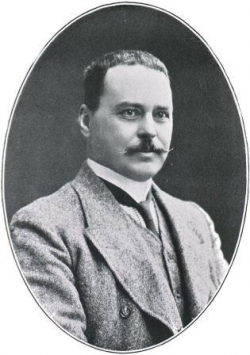Sir Ronald Ross

Sir Ronald Ross
- Born
- 13 May 1857
- Died
- 16 September 1932 (age 75)
Ronald Ross discovered that malaria is transmitted by mosquitoes. This has helped to find ways of controlling and preventing the disease, which even now, kills around 600,000 people every year.
When Ronald Ross was born, no-one knew what caused malaria, or how it was transmitted. The word malaria itself comes from the Italian for ‘bad air’, as in Europe, malaria was often associated with swampy areas.
Ronald Ross was born in 1957 in India, the eldest of ten children. His father was a general in the British Indian Army. Ross was talented in many areas, writing poems and novels, and composing songs. However, he chose to become a surgeon and went on to serve as a British officer in the Indian Medical Service. While he undertook research into several diseases, his main interest was in malaria and while conducting a study in 1896 he contracted the disease himself.
A major breakthrough in malaria research came in 1880, when Louis Alphonse Laveran found that malaria was caused by a parasite (protozoa of the Plasmodium genus). Following this discovery in 1897, Ross demonstrated that malaria parasites could be transmitted from infected patients to mosquitoes. Then, in studies of bird malaria, Ross was able to show that mosquitoes could transmit the malaria parasites from one bird to another. Ross was awarded the 1902 Nobel Prize in Physiology or Medicine. Laveran was awarded the Nobel Prize in 1907.
Ross’s contribution to medicine was recognised in many other ways in his lifetime. He was elected a Fellow of the Royal College of Surgeons and a Fellow of the Royal Society. He was appointed a Companion of The Most Honourable Order of the Bath by His Majesty the King of Great Britain, and was then given a Knighthood. He was given a Chair (professorship) at the School of Tropical medicine and the Ross Institute and Hospital for Tropical Diseases was named after him. It was in this hospital, in 1932, that he died after a long illness.
Malaria remains a major killer today, mostly in sub-saharan Africa, and it is estimated that around half of the world’s population (about 3.4 billion people) are at risk of catching the disease. However, the findings of Ronald Ross and his fellow scientists have allowed us to make great advances in preventing transmission of the disease, and our greater understanding of the parasites involved allows researchers to undertake informed drug design and vaccine development.
This page was written by a Biology: Changing the World volunteer.



